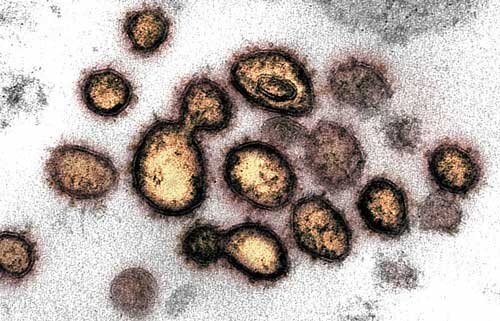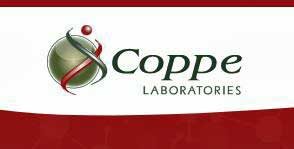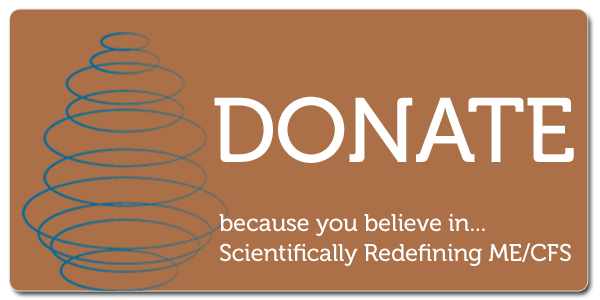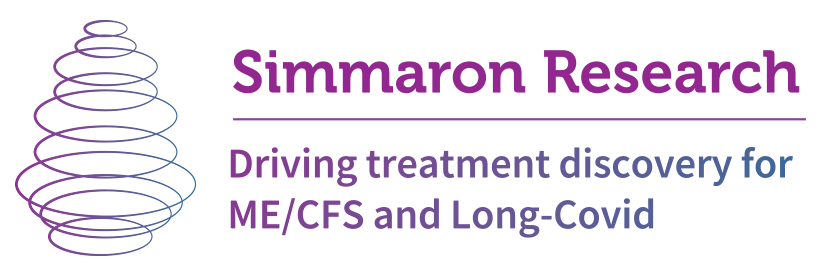From the Tahoe Outbreak to COVID-19 Dr. Peterson and Simmaron Take on the Coronavirus - and ME/CFS
“Testing is so important to everyone in our community, especially front-line workers and people who are at higher risk of severe disease. Simmaron is excited to serve our neighbors and lead the way to broader testing, so we help keep Nevada safe and learn more about this outbreak.” Courtney Miller, President of Simmaron’s Board.
 As Dr. Daniel Peterson watched an infectious disease outbreak bear down on his community like a freight train, his mind flashed back to a time, almost over 35 years ago, when a mysterious infectious event had sent scores of sick people to his office.The pathogen in what became the infamous 1984 Incline Village outbreak, which helped to put chronic fatigue syndrome (ME/CFS) on the map, has never been definitively identified. The inability to identify it has had significant ramifications: the patients weren't believed and the paltry CDC investigation chalked their symptoms up to hysteria.Being able to identify the original pathogen could have changed much for those involved and for how the disease was portrayed. Decades later, some of those afflicted still remain ill with chronic fatigue syndrome (ME/CFS). Theirs and Dr. Peterson's lives took a course change that no one could have anticipated.Since then Dr. Peterson focused specifically on the post-infectious cohort of ME/CFS patients. He was one of the few doctors to use Ampligen - an immune modulator - and introduced the use of the powerful antiviral Vistide to the field. He brought decades of experience dealing with post-infectious illnesses to the formation of the Simmaron Research Foundation ten years ago.http://simmaronresearch.com/2013/04/peterson-conference-presentation-reports-vistide-cidofovir-effective-in-treating-chronic-fatigue-syndrome-mecfs-patients-with-hhv6-and-hcmv-infections/In the decade since, at the core of Dr. Peterson and Simmaron's research has been a unique collaboration with Columbia University's Center for Infection and Immunity (CII), led by Dr. Ian Lipkin. CII's Dr. Mady Hornig is also a member of Simmaron's Scientific Advisory Board.Together, they have published 8 peer-reviewed manuscripts assessing the immune response across blood, spinal fluid and microbiota, identifying multiple subsets of ME/CFS and characterizing post-infectious immune patterns. The NIH's current intramural study of ME/CFS focused on post-infectious patients is an overdue but pivotal, and it turns out timely, acknowledgment of the role of infection in triggering this chronic disease.http://simmaronresearch.com/2019/03/nath-intramural-chronic-fatigue-study/#:~:text=The%20NIH%20Intramural%20Chronic%20Fatigue,and%20after%20an%20exercise%20test.Thirty-five years after Tahoe's CFS outbreak much has changed. We have technologies that can identify a pathogen almost in the blink of an eye. The identity of the SARS-CoV-2 virus hasn't been in doubt since early January.Some issues remain however. The low coronavirus testing capability in the North Tahoe region meant that even today many, probably most people infected with the virus, were not going to get tested - leaving them in anxious limbo, tying Dr. Peterson's hands to some extent, and leaving a key question unanswered.
As Dr. Daniel Peterson watched an infectious disease outbreak bear down on his community like a freight train, his mind flashed back to a time, almost over 35 years ago, when a mysterious infectious event had sent scores of sick people to his office.The pathogen in what became the infamous 1984 Incline Village outbreak, which helped to put chronic fatigue syndrome (ME/CFS) on the map, has never been definitively identified. The inability to identify it has had significant ramifications: the patients weren't believed and the paltry CDC investigation chalked their symptoms up to hysteria.Being able to identify the original pathogen could have changed much for those involved and for how the disease was portrayed. Decades later, some of those afflicted still remain ill with chronic fatigue syndrome (ME/CFS). Theirs and Dr. Peterson's lives took a course change that no one could have anticipated.Since then Dr. Peterson focused specifically on the post-infectious cohort of ME/CFS patients. He was one of the few doctors to use Ampligen - an immune modulator - and introduced the use of the powerful antiviral Vistide to the field. He brought decades of experience dealing with post-infectious illnesses to the formation of the Simmaron Research Foundation ten years ago.http://simmaronresearch.com/2013/04/peterson-conference-presentation-reports-vistide-cidofovir-effective-in-treating-chronic-fatigue-syndrome-mecfs-patients-with-hhv6-and-hcmv-infections/In the decade since, at the core of Dr. Peterson and Simmaron's research has been a unique collaboration with Columbia University's Center for Infection and Immunity (CII), led by Dr. Ian Lipkin. CII's Dr. Mady Hornig is also a member of Simmaron's Scientific Advisory Board.Together, they have published 8 peer-reviewed manuscripts assessing the immune response across blood, spinal fluid and microbiota, identifying multiple subsets of ME/CFS and characterizing post-infectious immune patterns. The NIH's current intramural study of ME/CFS focused on post-infectious patients is an overdue but pivotal, and it turns out timely, acknowledgment of the role of infection in triggering this chronic disease.http://simmaronresearch.com/2019/03/nath-intramural-chronic-fatigue-study/#:~:text=The%20NIH%20Intramural%20Chronic%20Fatigue,and%20after%20an%20exercise%20test.Thirty-five years after Tahoe's CFS outbreak much has changed. We have technologies that can identify a pathogen almost in the blink of an eye. The identity of the SARS-CoV-2 virus hasn't been in doubt since early January.Some issues remain however. The low coronavirus testing capability in the North Tahoe region meant that even today many, probably most people infected with the virus, were not going to get tested - leaving them in anxious limbo, tying Dr. Peterson's hands to some extent, and leaving a key question unanswered.
Catching it in the Act
 That question involved ME/CFS. Peterson knew that COVID-19 - the illness associated with the SARS-CoV-2 virus - was likely to birth an immense ME/CFS cohort. This time the outbreak presented a unique opportunity to catch the process of coming down with ME/CFS in the act. It also presented an opportunity to educate a whole generation of doctors about post-infectious illnesses and ME/CFS.That could only really happen, though, if Dr. Peterson and other doctors and researchers knew their patients had been infected with the coronavirus. COVID-19, after all, will be taken seriously. The common cold will not. It was critical, therefore, to get people tested.Just as inadequate testing tied Peterson's hands almost 40 years ago, shortages in vital test kit components were tying his hands today.
That question involved ME/CFS. Peterson knew that COVID-19 - the illness associated with the SARS-CoV-2 virus - was likely to birth an immense ME/CFS cohort. This time the outbreak presented a unique opportunity to catch the process of coming down with ME/CFS in the act. It also presented an opportunity to educate a whole generation of doctors about post-infectious illnesses and ME/CFS.That could only really happen, though, if Dr. Peterson and other doctors and researchers knew their patients had been infected with the coronavirus. COVID-19, after all, will be taken seriously. The common cold will not. It was critical, therefore, to get people tested.Just as inadequate testing tied Peterson's hands almost 40 years ago, shortages in vital test kit components were tying his hands today.
Solving the Testing Snafu
What to do? Dr. Peterson and the Simmaron Research Foundation had formed a strong connection with Coppe Labs - an FDA CLIA certified pathogen testing lab with high-complexity clinical testing status. The founder of the lab, Dr. Konstance Knox, actually sits on the Simmaron Research Foundation's Scientific Advisory Board. Dr. Knox has been testing ME/CFS patients for viral infection, reactivation and antibodies for decades. Peterson, Simmaron staff, and Knox brainstormed. The nasopharyngeal swabs currently being used to identify the virus were available but the viral media they needed to be placed in was not. But what about the urogenital swabs being used for some rapid polymerase chain reaction test (PCR) testing? They could be shipped frozen in saline to labs for testing.An application for an Emergency Use Authorization (EUA) from the Food and Drug Administration to collect and test samples using that technique was granted. So was an application to provide an IgG antibody test.Gunnar Gottschalk, PhD, Simmaron's Clinical Research Director and emerging scientist trained by Dr. Peterson, Simmaron and Rush University, led the effort.
Peterson, Simmaron staff, and Knox brainstormed. The nasopharyngeal swabs currently being used to identify the virus were available but the viral media they needed to be placed in was not. But what about the urogenital swabs being used for some rapid polymerase chain reaction test (PCR) testing? They could be shipped frozen in saline to labs for testing.An application for an Emergency Use Authorization (EUA) from the Food and Drug Administration to collect and test samples using that technique was granted. So was an application to provide an IgG antibody test.Gunnar Gottschalk, PhD, Simmaron's Clinical Research Director and emerging scientist trained by Dr. Peterson, Simmaron and Rush University, led the effort.
“The supply chain crisis has severely hindered the nation’s COVID-19 testing capability. We repurposed materials and sought a creative solution which helped our collaborative team achieve FDA authorization rather quickly for both the PCR and the IgG antibody test. This ingenuity, along with the hard work of our research staff, places us in a position to be the leader for COVID-19 testing in Northern Nevada.”
Over the past several weeks, over 500 people have been tested in the Tahoe area for the virus. Since getting approval, the Simmaron Research Foundation has been seeking local funding to allow it to test economically disadvantaged residents.
This Time It's Different
This time it's different. Many of those sickened by the virus will not have to live in limbo. Doctors will be able to follow COVID-19 treatment guidelines knowing that their patients actually have COVID-19. Doctors will be able to treat patients and track their stages of recovery without being ostracized or looked down up. Simmaron can help elucidate the long term impacts of this virus and use that to inform our understanding of chronic ME/CFS.This time, if pandemic patients develop ME/CFS, doctors will know they did so not because of an unidentified, usually benign cold virus but because of COVID-19 - a fearsome pathogen we know can wreak havoc on many systems of the body. They won't be able to sweep ME/CFS under the rug with claims of hysteria, depression or somatization like they did 35 years ago.Knowing COVID-19 is involved is a potential game changer not just for the patients who have trouble recovering, and the doctors treating them, but for the field of ME/CFS itself. The opportunity exists for this disease to finally be taken seriously.Finally, it shouldn't pass notice that simply by taking center stage in the Northern Tahoe COVID-19 testing effort, the Simmaron Research Foundation - which is devoted to understanding and treating ME/CFS - is spreading the word on ME/CFS and publicly rooting it in the science of post-viral disease - something the world is likely soon to become all too familiar with.To learn more about Simmaron Research’s COVID-19 testing effort:Email: covid19@simmaron.comVisit: simmaronresearch.comTo donate to Simmaron Research, visit: https://donatenow.networkforgood.org/SimmaronResearch
